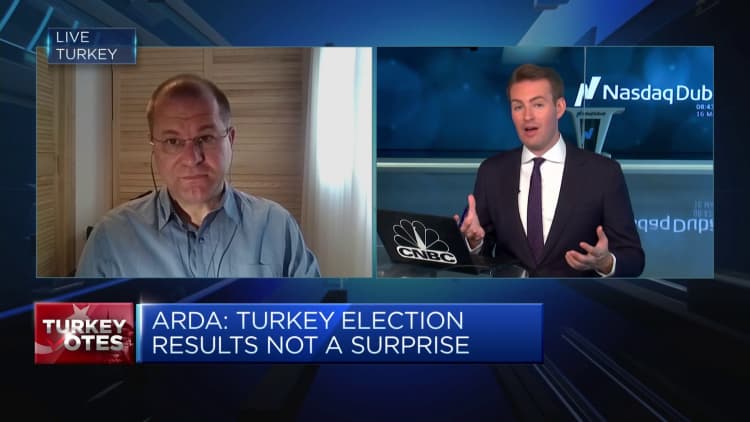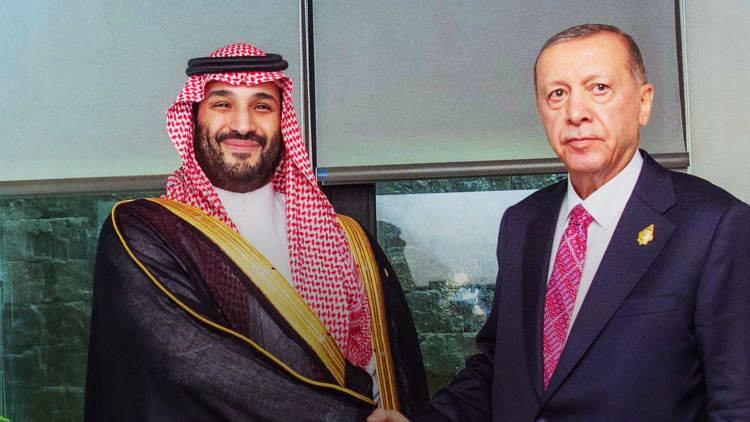Turkey votes in runoff election after candidates double down on nationalism and fear
People walk past an election campaign poster for Turkey’s President Recep Tayyip Erdogan on May 25, 2023 in Istanbul, Turkey. The country is holding its first presidential runoff election after neither candidate earned more than 50% of the vote in the May 14 election.
Chris Mcgrath | Getty Images News | Getty Images
Millions of Turks are casting their ballots Sunday for the second time in two weeks to decide the outcome of what has been the closest presidential race in Turkey’s history.
The powerful incumbent President Recep Tayyip Erdogan, 69, faced off against opposition leader Kemal Kilicdaroglu in what many described as a the most serious fight of Erdogan’s political life and a potential death blow to his 20-year reign. But the initial round of voting – which saw a tremendous turnout of 86.2% – proved a disappointment for the opposition, with the 74-year-old Kilicdaroglu trailing by roughly 5 percentage points.
Still, no candidate surpassed the 50% threshold required to win; and with Erdogan at 49.5% and Kilicdaroglu at 44.7%, a runoff election was set for two weeks after the first vote on May 14. The winner will preside over a divided country in flux, a cost-of-living crisis, complex security issues, and – as the second-largest military in NATO and a key mediator between Ukraine and Russia – an increasingly crucial role in global geopolitics.
Country analysts are all but certain of an Erdogan victory.
“We expect Turkey’s President Erdogan to extend his rule into its third decade at the run-off election on 28 May, with our judgment-based forecast assigning him an 87% chance of victory,” Hamish Kinnear, senior MENA analyst at risk intelligence firm Verisk Maplecroft, wrote in a research note.
In the span of two short weeks, some of the candidates’ campaign messaging has changed dramatically, and both contenders have doubled down on malicious accusations, hard-core nationalism, and scapegoating.
‘Send all refugees home’
Kilicdaroglu, known for his more conciliatory, soft-spoken demeanor, made a stunning lurch toward xenophobia and fear-mongering as part of his runoff campaign strategy, tapping into widespread Turkish discontent toward the country’s more than 4 million refugees.
He promised to “send all refugees home” if elected, and accused Erdogan of flooding the country with them. He also claimed that Turkey’s cities would be at the mercy of criminal gangs and refugee mafias if Erdogan were to stay in power. The vast majority of refugees in Turkey are from neighboring war-torn Syria.
Kemal Kilicdaroglu, the 74-year-old leader of the center-left, pro-secular Republican People’s Party, or CHP, delivers a press conference in Ankara on May 15, 2023.
Bulent Kilic | Afp | Getty Images
Previously, Erdogan’s top rival had been running on a platform of reclaiming economic stability, democratic values and better relations with Europe and NATO.
Kilicdaroglu’s new strategy appeared to be in response to the fact that a third party hardline nationalist candidate, Sinan Ogan, won just over 5% of the vote on May 14, essentially making him a kingmaker. Whoever Ogan endorsed would likely gain a potentially decisive portion of his voters – and despite Kilicdaroglu cranking up the nationalist and anti-refugee rhetoric, Ogan ultimately endorsed Erdogan.
“Kilicdaroglu has adopted a harder line on immigration and security ahead of the run-off … is unlikely to be enough,” Kinnear said.
Erdogan’s supporters, meanwhile, circulated numerous fake posters and videos aimed to look like Kilicdaroglu’s party, the CHP, supported Kurdish militant groups that Ankara classifies as terrorists.
German news outlet DW reported that the posters were fake, citing Turkish fact-checking organization Teyit.org.
And in a televised interview on Tuesday, Erdogan admitted to screening doctored footage during his campaign rallies of Kilicdaroglu that falsely portrayed the latter convening with Kurdish militants.

In a surprise twist, a far-right wing, anti-migrant party called Victory Party threw its support behind Kilicdaroglu on Wednesday, due to his pledge to return refugees to Syria — splitting right-wing groups between the two presidential contenders.
“Now we have two anti-refugee political leaders supporting the rival candidates,” Ragip Soylu, Turkey bureau chief at Middle East Eye, pointed out in a Twitter post.
Economy, earthquakes
Erdogan’s continued and seemingly unshakeable popularity comes despite several years of economic deterioration in the country of 85 million.
Turkey’s lira lost roughly 80% of its value against the dollar in five years and the country’s inflation rate is around 50%, thanks in large part to the president’s unorthodox economic policy of lowering interest rates despite already high inflation.
And a series of devastating earthquakes in February killed more than 50,000 people, a tragedy made worse by a slow government response and reports of widespread corruption that allowed construction companies to skirt earthquake safety regulations for buildings.
People carry a bodybag as local residents wait for their relatives to be pulled out from the rubble of collapsed buildings in Hatay, on February 14, 2023, after a 7.8-magnitude earthquake struck the country’s south-east.
Bulent Kilic | Afp | Getty Images
But Erdogan appears largely politically untouched; he still won the most votes in Turkey’s eastern earthquake-hit provinces, which are overwhelmingly Islamically conservative. Additionally, his powerful AK Party won the majority in Turkey’s Parliament, meaning his opponent would have far less power as president.
“Erdogan wasted no time in calling on voters to back him to avoid a destabilizing split between the parliament and president,” Kinnear said. Kilicdaroglu, meanwhile, has appealed to the 8 million Gen Z and Kurdish voters who did not vote in the first round to come out and back him.
Already, though, his anti-refugee rhetoric has angered many of his supporters and prompted resignations from some of his campaign allies.
With the incumbent’s victory looking ever more secure, analysts aren’t holding their breaths for a return to economic normality. Already Turkey’s central bank is aggressively imposing new regulations to stifle local lira purchases of foreign currency, in an effort to prevent further falling of the lira. The currency dipped to its lowest level against the dollar in six months after the first round of voting, when Erdogan’s lead became clear.

“Investors shouldn’t expect a fundamental shift to Turkey’s unorthodox approach to economic policymaking anytime soon. Erdogan’s belief that lower interest rates lead to lower inflation, which influences monetary policy, will continue to spook the markets,” Kinnear wrote.
Amid speculation on the lira’s direction after the vote, Timothy Ash, emerging markets strategist at BlueBay Asset Management, said that the only question now is “how weak the lira goes and how, without the ability to use higher interest rates, the CBRT (Turkish central bank) can prevent a devaluation-inflation spiral again.”
For all the latest World News Click Here
For the latest news and updates, follow us on Google News.

